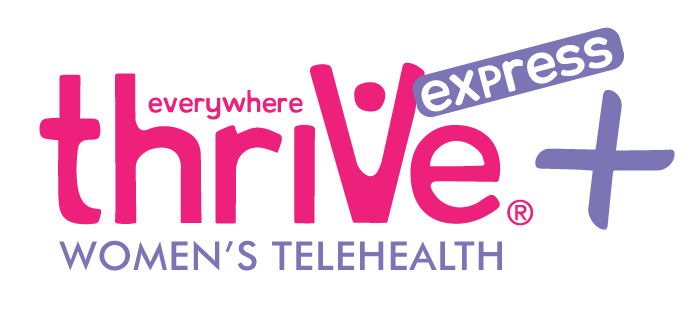This article was updated February 2025
Hello! You’ve found the Nurse’s Corner at ThriVe. This blog section is part of a community of women supporting women. We are nurses, advocates, and your women’s health village. Are period symptoms making you wonder, “What are the major signs of hormonal imbalance?”? Today, let’s chat about something a lot of women deal with: the hormone imbalance PCOS (Polycystic Ovary Syndrome) and menstrual disorders. Sometimes, doctors prescribe hormone therapy to help with these conditions.
What is PCOS?
PCOS is a problem with hormones that affect your cycle. It can cause you to have irregular periods or periods that last for longer than normal. If you have PCOS, you might also have too much androgen (a hormone) in your body, which can cause acne and excess facial and body hair.1
With PCOS, lots of little fluid-filled sacs (called cysts) develop on the ovary. These little sacs contain eggs that aren’t mature, and the follicles of the ovary don’t release eggs the way that they’re supposed to.1
Doctors aren’t exactly sure what causes PCOS, but it can lead to type 2 diabetes and heart disease if it’s not identified and treated.1
But have you ever wondered, “What are the major signs of hormonal imbalance, and are there natural ways to feel better and support your body?” We believe in holistic health. That means taking care of body, mind, and spirit. Make sure to talk with your doctor about your specific situation, but there are natural, healthy lifestyle changes that could be helpful for you. You deserve great health.
Lifestyle change: what you put in your body
First off, let’s talk about food. We all know that food impacts our bodies in major ways. But what about helping your hormones? Eating a balanced diet with a low-glycemic index can actually help! Low-glycemic foods are ones that don’t spike your blood sugar too much, like whole grains, vegetables, and beans.. Staying at a healthy weight can lower insulin and androgen levels — and may even help your ovulation cycle! Ask your doctor if these kinds of foods might help manage your insulin levels and reduce PCOS symptoms.2
So what might a healthy, balanced diet with complex carbs look like on a day-to-day basis? Of course, talk with your doctor or nutritionist about your specific dietary needs. But here are some ideas for tasty, healthy meals.
What are the Major Signs of Hormonal Imbalance: Possible Menus for PCOS and Menstrual Health
Breakfast:
– Option 1: Greek yogurt with a handful of berries, a sprinkle of chia seeds, and a drizzle of honey.
– Option 2: Whole grain toast topped with avocado and a poached egg, with a side of mixed greens.
– Option 3: Smoothie made with spinach, banana, a scoop of protein powder, and almond milk.
Lunch:
– Option 1: Quinoa salad with chickpeas, cucumbers, tomatoes, and a lemon-tahini dressing.
– Option 2: Grilled chicken wrap with whole grain tortilla, lots of veggies, and a light yogurt-based dressing.
– Option 3: Lentil soup with a side of whole grain bread and a small apple.
Snack:
– Option 1: A small handful of almonds and a piece of fruit.
– Option 2: Carrot sticks with hummus.
– Option 3: A small bowl of mixed berries.
Dinner:
– Option 1: Baked salmon with a side of roasted sweet potatoes and steamed broccoli.
– Option 2: Stir-fry with tofu, lots of colorful veggies, and brown rice.
– Option 3: Turkey chili with beans, served with a small green salad.
Dessert:
– Option 1: Dark chocolate square and a cup of spearmint tea.
– Option 2: Chia pudding made with coconut milk and topped with fresh fruit.
– Option 3: Baked apple slices with a sprinkle of cinnamon.
If you’re wondering, “What are the major signs of hormonal imbalance, and can my diet make a difference,” there are lots of yummy options that can help contribute to healthy hormones levels! You might ask your doctor about starting with changing your diet, and see if that helps.
Move your body
Adding regular exercise can make a big difference in managing PCOS and menstrual disorders.2, 3 It can be tough to get started. Don’t be hard on yourself. If you aren’t used to exercise, start slow! It’s okay to take baby steps. This isn’t about changing the way your body looks. This is self-care that benefits your hormonal health. Here’s a simple weekly routine with some easy exercises:
Monday:
– Activity: 30-minute brisk walk
– Bonus Exercise: 10 minutes of stretching
Wednesday:
– Activity: 20-minute yoga session (try an online beginner’s video)
– Bonus Exercise: 10-minute core workout (like planks and leg raises)
Friday:
– Activity: 30-minute dance session to your favorite music
– Bonus Exercise: 10 minutes of light strength training (using household items as weights if needed)
Sunday:
– Activity: 30-minute bike ride or swim
– Bonus Exercise: 10 minutes of stretching
What are the major signs of hormonal imbalance, and can exercise be beneficial? Yes! Doing light exercise every other day can actually make a huge difference! It might not seem like it at first, but it will. You’re worth it.

Practicing mindfulness
Managing stress is crucial for hormonal balance. Did you know your mental health can impact your physical health? You need to take time for yourself. Make time for you, girl! Here’s some ideas to incorporate mindfulness activities into your routine
Daily:
– Morning: 5 minutes of deep breathing exercises
– Evening: 10 minutes of journaling about your day and what you’re grateful for
Weekly:
– Tuesday: 15 minutes of guided meditation (use a meditation app or online video)
– Thursday: 20 minutes of mindful walking (focus on your surroundings, the sounds, and your breath)
– Saturday: 30 minutes of a relaxing activity you enjoy (reading, drawing, or taking a warm bath)
Have any of these symptoms?
Wondering what are the major signs of hormonal imbalance, and could I have PCOS (or other menstrual issues)? If you make an appointment, you want to go with confidence. Here’s a simple checklist to help you identify some common signs and symptoms. Take note of any of these that resonate with you:
– Irregular periods (too few or too many)
– Heavy bleeding during periods
– Severe menstrual cramps
– Excessive hair growth on the face, chest, or back
– Acne
– Weight gain
– Thinning hair or hair loss on the scalp
– Darkening of the skin in body creases1, 4, 5
If you check off several of these symptoms, it’s a good idea to talk to your healthcare provider. They can help you figure out what’s going on and what treatments or lifestyle changes might be best for you. Remember that you deserve good health. It’s worth taking time to get to your appointment. Your doctor will know how to help you. You don’t have to keep living with these symptoms.

While these natural steps might not completely replace hormone replacement therapy, they can make a big difference in how you feel. It’s all about finding what works best for you and your body.
At ThriVe, we want to empower you to understand and care for your sexual and reproductive health. We offer no-cost women’s services, including pregnancy tests, STI tests, and pre-abortion screenings.
If you’re thinking about trying any of these natural remedies, talk to your healthcare provider first. They can help you figure out what’s best for your unique needs, whether that’s menopause, estrogen support, mood swings, night sweats, or vaginal yeast infections.
You’ve got this! Take care and remember, small steps can lead to big changes.
Sources:
1 https://www.mayoclinic.org/diseases-conditions/pcos/symptoms-causes/syc-20353439
2 https://www.mayoclinic.org/diseases-conditions/pcos/diagnosis-treatment/drc-20353443
3https://www.mayoclinic.org/diseases-conditions/menstrual-cramps/diagnosis-treatment/drc-20374944
4https://www.cdc.gov/diabetes/risk-factors/pcos-polycystic-ovary-syndrome.html?CDC_AAref_Val=https://www.cdc.gov/diabetes/basics/pcos.html?ref=verygoodlight.com
5https://www.mayoclinic.org/healthy-lifestyle/womens-health/in-depth/menstrual-cycle/art-20047186




